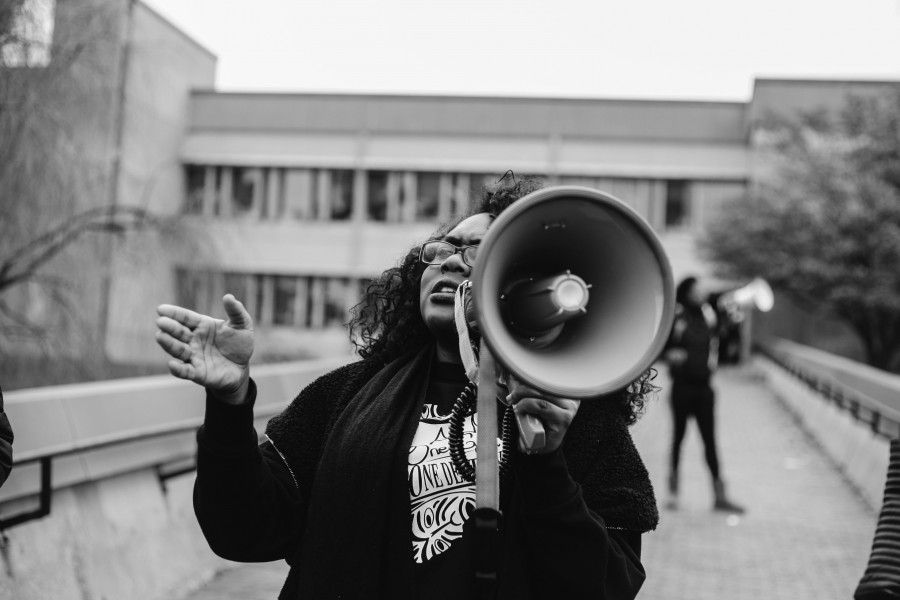Chancellor and Provost hear demands for racial inclusivity
On Sunday, Nov. 22, fifty students and faculty members joined Chancellor Kumble Subbaswamy and Provost Kathleen Newman in the Malcolm X Center for an “answering session” regarding the lack of diversity at the University of Massachusetts Amherst.
Following an organized student walkout and a listening session with the chancellor, the Black Student Union (BSU) presented a list of demands to help create a more diverse and inclusive campus environment to administration.
Demands included intensive recruitment of students of color from Springfield and Holyoke; increased funding for financial aid and Registered Student Organizations (RSOs) serving students of color; more diversity among professors, staff, and students; and a method for addressing racialized, violent threats in person and on Yik Yak, the anonymous social media app.
BSU speakers said that the large number of unaddressed issues at UMass prompted the demands, which were similar to other pleas made at universities throughout the country since the University of Missouri president was forced to step down amid racial tension.
Speakers also called for more diversity in the Student Government Association (SGA) and an overhauled Residential Advisor (RA) training program that teaches RAs to act more responsively towards incidents of racial discrimination.
Sheena Jeune, vice president of BSU, told the crowd that the issues she faces as a black leader helped spur the recent protests and demands. The effects of violent threats and racist statements, she said, takes a toll on students’ psyches.
“I don’t feel safe on this campus as a leader. I live in Dorchester; I come to Amherst to feel safe. Not saying I can’t handle myself,” she said, “but as a black woman, I feel skeptical when people are saying ‘hi’ to me and [that] they could be the ones [who] were threatening my peers. I have to keep my head up,” she continued, “wondering who saw me march at Blue Wall. I shouldn’t have to feel threatened coming down to my building.”
Subbaswamy responded, saying that some threats, like those made anonymously on Yik Yak, were “reprehensible” but beyond the university’s control. Still, he stressed that he is responsible above all others for maintaining a safe environment on campus.
“I’m the guy who is supposed to be blamed for everything,” said Subbaswamy, “I’m the one responsible.”
The chancellor also apologized for his lack of understanding on the issues raised, and called for a campus inclusive of “all differences, orientations, expressions, races and ethnicities.”
Provost Kathleen Newman agreed with these statements, saying that she hopes diversity at UMass “will come to mirror as best as we can the composition of the community and help reach the dreams of all ethnic groups.”
Student Zareb Noel offered a few demands in addition to the others, explaining that, as a Commonwealth Honors College (CHC) student, he could not find statistics on diversity within the college’s program or for buildings in the CHC residential area. This information, he said, should be readily available online, for both current and potential students, in three clicks or less.
As a mechanical engineering major and a student enrolled in African-American (Afro-Am) studies classes, Noel could not identify a single black or brown engineering professor, and echoed the BSU’s demands for a five percent increase in faculty of color in the Afro-Am and sociology fields, along with increased diversity at the Stonewall Center and the Center for Counseling and Psychological Help.
Newman responded that in addition to a new admissions office in Boston, the administration will try “to recruit our friends from Dorchester.” She said that the school admits far more students of color than they enroll because of financial reasons, and while the school already spends $45 million on financial aid, she said, that number could “easily double.”
Afro-Am Studies Chair John H. Bracey Jr. responded to concerns about classes in the department taught by white professors. He encouraged more black students to get involved in the field and explained why so many white professors teach in the department.
“We’re outnumbered in the field. When we fill a position, we get 60 to 70 percent of our applications from white people… and I’m not going to hire someone just because they are black,” he said. “The best minds often do not want to go into Afro-Am, but it’s not the job of minorities to do all the work against racism.”
Assistant Provost of Diversity Leykia Brill explained her obstacles when recruiting black students at UMass, saying high schools do not actively encourage those students to enroll in four-year colleges.
“I am told when I get there that [black students] are not viable for UMass; they’ll never get in. That’s the difficulty of recruiting minorities, helping people believe they can get into the school,” Brill said.
According to student speakers, the cost of attending UMass exceeds the average income of a family in the predominantly black and brown city of Springfield.
The BSU called for changes in UMass Residential Life, as Jeune demanded special RA training on racial sensitivity, directed by “credible facilitators” and not Residential Directors, who are predominantly white. Other students stressed the need for Residential Academic Programs (RAPs) created specifically for students of different colors and cultures.
One student said that she went to an RA after being called “the N-word,” only to be told “it’s not big deal, it’s just a word.” Dean of Students Enku Gelaye apologized to her personally.
Other demands include monthly town hall meetings, increased student engagement through social media on important hiring and student life decisions, and stricter standards on what classes fulfill the diversity general education requirement for students.
An open forum with Chancellor Subbaswamy regarding the school’s official diversity plan is scheduled for Thursday, Dec. 3, at 5:30 p.m. in Mahar Auditorium.
Eric Polleys contributed to this report.
Email Brian Bevilacqua at bbevilac@umass.edu.






